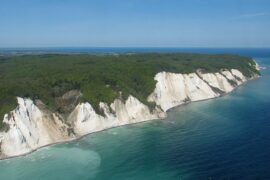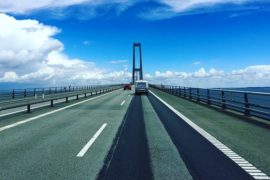Taking a ferry is a lovely chilled way to start your trip. It’s less stressful, greener and more fun than flying.
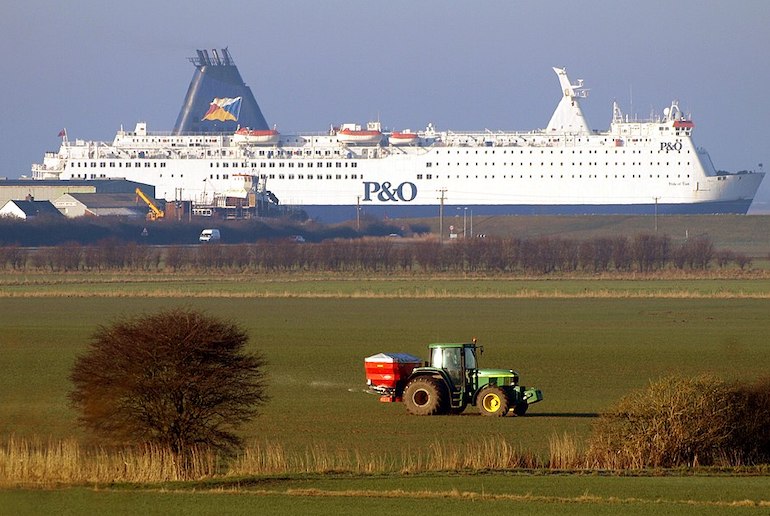
So if you’re travelling from the UK to France, Belgium or the Netherlands it’s a no-brainer to take the ferry.
But what about Denmark? How feasible it to get to Denmark by ferry?
Sadly, there are currently no direct passenger ferries from the UK to Denmark, but it is possible to get there via the Netherlands and Germany. Read on to find all about the best way to get to Denmark overland.
Direct ferries from the UK to Denmark
DFDS used to run a direct ferry link from Harwich in Essex on England’s east coast to Esbjerg on the west coast of Denmark’s Jutland peninsula.
Sadly the M/S Dana Sirena was taken out of service in 2014, and the ship now runs from Karlshamn in Sweden to Klaipėda in Lithuania.
However, there’s a strong grassroots movement campaigning to have the route reinstated. RHEG (Re-open the Harwich to Esbjerg ferry Group) includes campaigners from both the UK and Denmark as well as other Scandinavian countries and is active in trying to get a ferry link between the UK and Denmark reinstated.
They have set up an online petition to lobby for the ferry to re-start or an alternative UK to Denmark ferry route to be set up.
We hope they’ll be successful, but until they are, ferry lovers will have to choose an alternative (more long-winded!) route to Denmark.
Indirect routes to Denmark from the UK
There are currently three main options for getting to Denmark by ferry, all via the Netherlands. Overall journey times for all three routes are not too different, so which route you take will probably depend on which part of the UK you are leaving from.
There are also routes via France, which may be quicker overall but involve more driving.
Newcastle to Amsterdam
The DFDS overnight car ferry from Newcastle to Ijmuiden (the port for Amsterdam) leaves Newcastle daily at 5pm and arrives in Amsterdam at 9.45am the following morning. The journey takes just under 17 hours.
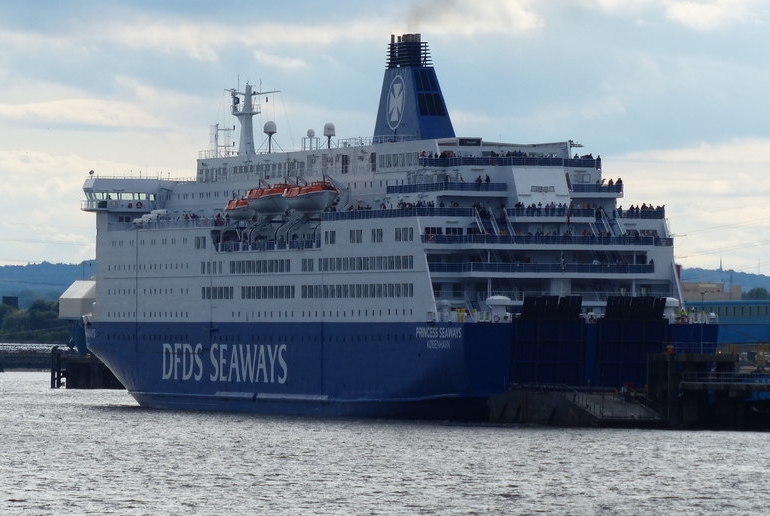
From Ijmuiden it takes six and half hours to drive to Puttgarden (in Germany), where you catch a ferry to Rødby (in Denmark), a journey of 45 minutes. From Rødby, it’s about one hour, fifty minutes to Copenhagen.
The ferry runs every thirty minutes or so including throughout the night, so it’s possible to leave Newcastle at 5pm in the evening and arrive in Copenhagen late the following evening.
Harwich to Hook of Holland
Stena Line ferries run from Harwich in Essex to the Hook of Holland in the Netherlands twice a day.
Ferries leave Harwich at 9am and arrive in the Hook of Holland at 5.15pm, and the overnight ferry leaves at 11pm, arriving at 8am the following morning.
From the Hook of Holland, it takes just under ten hours to drive to Copenhagen, via the Puttgarden to Rødby ferry (see above), making this the quickest sea and land route to Copenhagen from the UK.
Hull to Rotterdam
The P&O Hull to Rotterdam overnight ferry leaves Hull on England’s East coast at 8.30pm each evening and arrives in Rotterdam at 8.30am the following morning. The journey takes 11 hours.
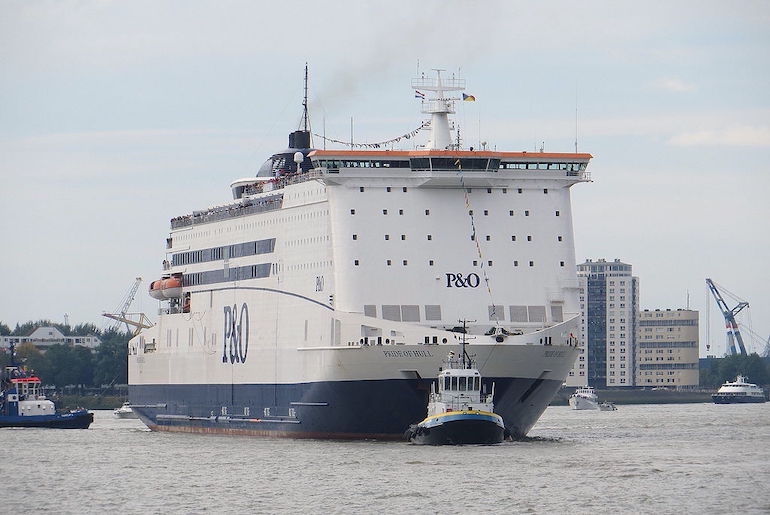
From Rotterdam to Copenhagen, via the Puttgarden to Rødby ferry (see above), take about nine hours, 30 minutes in total.
Dover to Calais and Dunkirk
If you live in the south of England, taking a ferry via France will probably be quicker overall, although it will involve more driving.
DFDS, P&O and Irish ferries run from Dover to Calais with ferries leaving every hour or so throughout the day (journey time one hour, 30 minutes). DFDS also runs about 12 ferries a day from Dover to Dunkirk (journey time 2 hours).
The Calais ferry is slightly quicker, but it takes twelve hours and forty minutes to get to Copenhagen, while from Dunkirk it takes twelve hours and ten minutes, so overall there’s little difference between the two routes.
Both involve taking the Puttgarden to Rødby ferry (see above).
Cargo ships from the UK to Denmark
Currently the only direct ferries from the UK to Denmark are for freight only. DFDS runs a nightly cargo ship from Immingham in Lincolnshire to Esbjerg, which leaves at 7.30pm and arrives at 3.30pm the following day.
However, you can’t travel as a foot passenger or book private cars on the crossing. The smallest vehicle they will accept is a van (with proof of commercial vehicle status) and there are a maximum of just 12 passengers per sailing.
The price of a van with one passenger is expensive, starting at £904 each way.
Additional options
There are, of course, quicker and cheaper options for getting to Denmark from the UK. These include going on Le Shuttle, the train and flying.
Le Shuttle
Formerly Eurotunnel, Le Shuttle is probably the cheapest and quickest way of crossing the Channel. You drive your car onto a double-decker train, which takes 35 minutes to run from Folkestone to Calais in France.
The shuttle leaves every 20 minutes or so during the day (less frequently at night). It takes twelve and a half hours to drive from the Calais Shuttle terminal to Copenhagen via the Puttgarden to Rødby ferry (see above).
By train
It is possible to travel from the UK to Copenhagen by train, but whichever route you chose will involve an overnight stay in either Brussels, Cologne or Hamburg.
We think the best route is to take any Eurostar train from London to Brussels and spend the night there. You can then travel from Brussels to Copenhagen in a day.
Leave Brussels Midi station at 8.23am on the German Deutsche Bahn intercity train, which arrives in Cologne at 10.15. You leave Cologne at 12.11 on a Deutsche Bahn intercity train and arrive in Hamburg at 4.14pm.
Here you’ll change onto a Danish intercity train which leaves at 4.54pm and arrives in Copenhagen at 9.34pm.
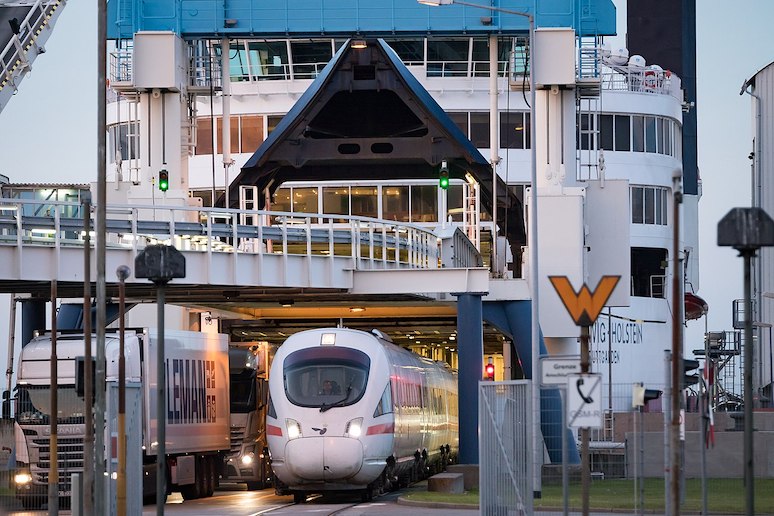
Until 2019, the train was actually driven onto the Puttgarden to Rødby ferry and off the other side, but now it takes an overland route via Odense and across the Storebælt Bridge.
The Brussels to Copenhagen stretch takes from 13 to 15 hours, depending on connections, and can be booked though Omio. London to Brussels must be booked through Eurostar.
The Deutsche Bahn trains are comfortable with a restaurant car, charging points at all seats and free wifi, while the Danish intercity train has free wifi in Denmark, but no catering car.
By plane
Of course, flying is the least green option but it’s most certainly the quickest. And often the cheapest too, if you can book in advance and travel off-peak on a budget airline.
The journey time is around one hour, 45 minutes, with fares starting from as low as £30 each way.
Ryanair flies three times a day from Stansted to Copenhagen. From Heathrow, SAS flies five times a day and British Airways has six fights a day. From Gatwick, EasyJet flies twice daily, while Norwegian has four flights a day.
Ferry ports in Denmark
Whichever of the above ferry and car routes you take you’ll arrive in Denmark at the port of Rødby, on the south coast of Lolland Island.
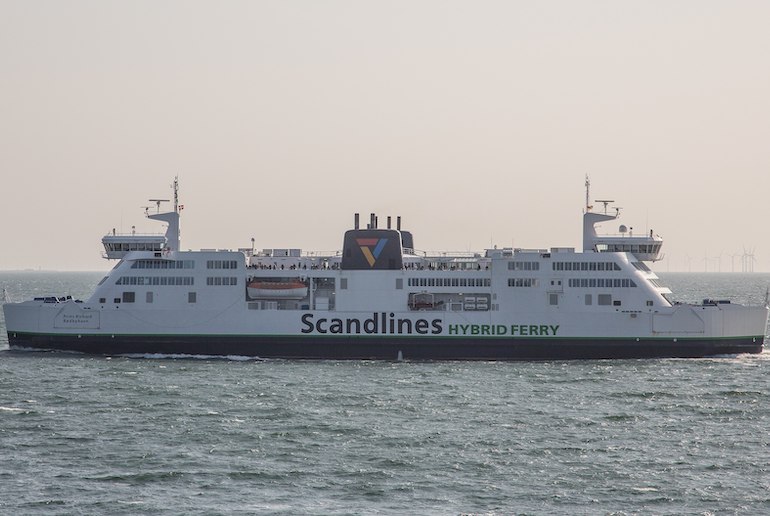
The crossing from Puttgarden to Rødby is one of Europe’s busiest ferry routes, and the port is about 5km south of town of Rødby.
The ferry terminal has a waiting area, parking spaces and toilets, with hotels, petrol stations, restaurants, chemists and shops on the main road out of the harbour.
From Rødby, it takes about one hour, fifty minutes to drive to Copenhagen. Flixbus runs one bus a day from Rødby Færge to Copenhagen, which takes two hours and 15 minutes: you can book it through Omio.
Ferry ports in the UK
If you live in the north of England, the most useful ports are likely to be Newcastle or Hull.
The Newcastle ferry terminal is actually about nine miles east of Newcastle city centre in North Shields. You can drive there in about 20 minutes, or there’s a DFDS transfer bus from the city centre to the terminal.
The nearest metro stations are Percy Main or Meadowell.
From Hull, ferries to Rotterdam leave from terminal one and the check-in closes ninety minutes before the ferry departure time, so make sure you allow yourself enough time. The port is to the east of the city of Hull, about 15 minutes from the city centre via the A63.
Harwich ferry port lies just north of the town of Harwich, and is accessed from London via the A12 and A120. Trains from London Liverpool Street to harwich take one hour, 15 minutes, and can be booked via Omio.
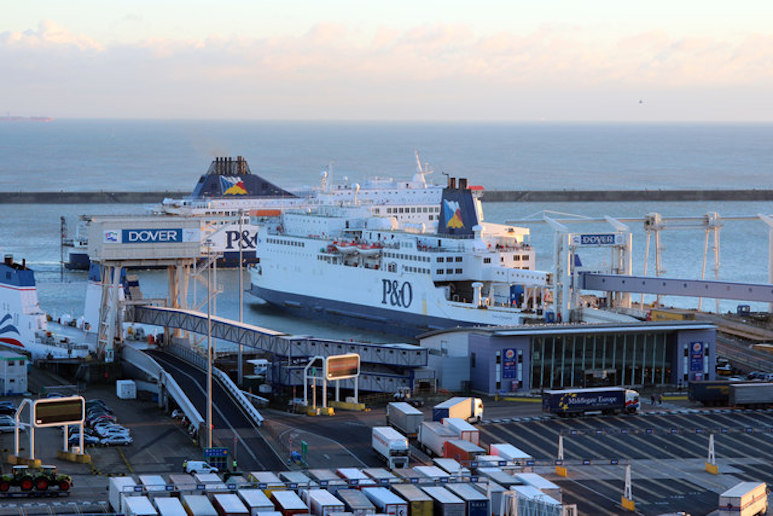
Dover is the main ferry port for London and the southeast, and is the UK’s busiest international ferry port, used by over 10 million passengers a year. Seventy miles from London, it’s accessed via the M20 and A20.
Because it’s so busy and there are often delays at security or customs, make sure you allow enough for your trip.
What are the pros and cons of taking the ferry to Denmark?
There’s no denying that taking the ferry is slower than flying and you will have to do a lot of driving on the continent to get to Denmark.
It can also be more expensive than flying, once you’ve factored in an overnight cabin.
However, we think taking the ferry is more relaxed, slower form of travel. You can take your own car, so don’t need to hire one on the continent.
And it’s also greener, with many ferry companies introducing hybrid ferries which can run on both diesel and electric to reduce their carbon footprint.
So, if you do want to take the slow route and see some countryside on the way, we recommend you check ferry times and routes and buy your tickets on Direct Ferries.
See also:
Getting from Copenhagen to Malmo
Scandinavian ferry routes
Denmark travel guide




